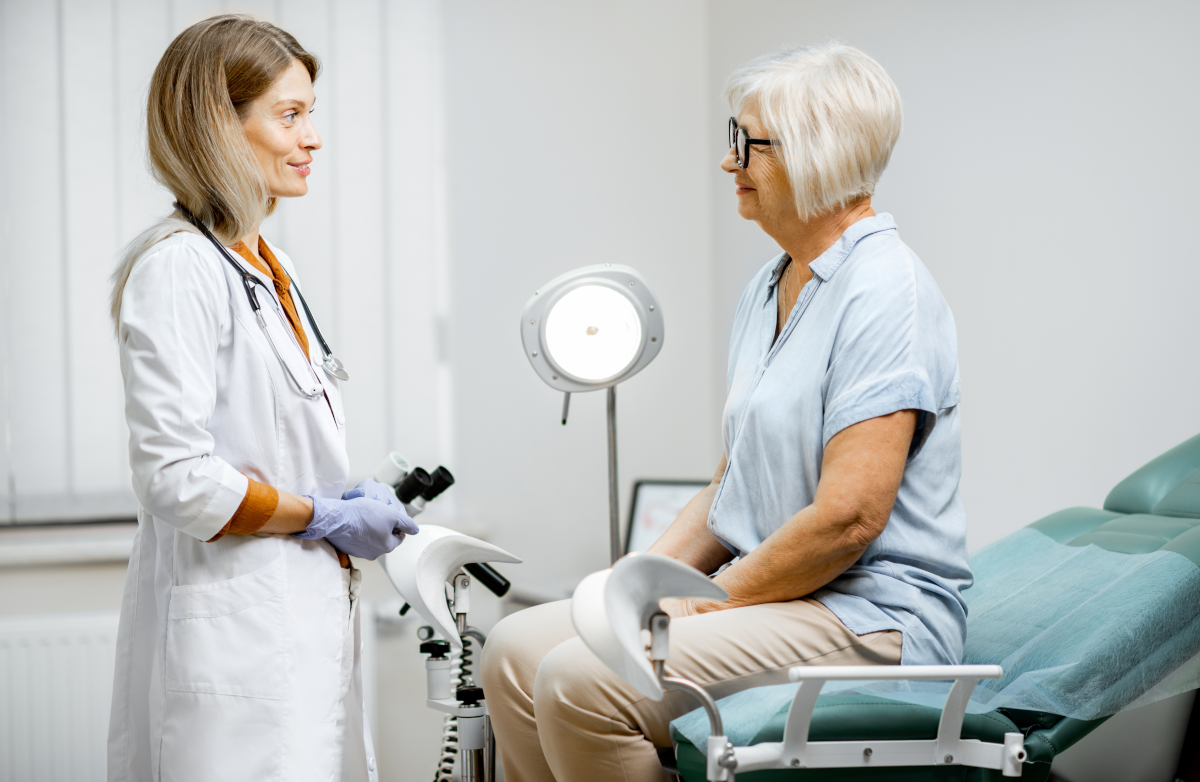
If you are a woman and approaching the age of 45, you might have some questions about the inevitable next phase of life: menopause. Although menopause is a normal and natural part of female aging, it can sometimes feel taboo to discuss, both with close friends and family or even a medical professional. Each woman’s experience with menopause can be quite different, which can make women feel somewhat alone when it comes to what to expect or how to prepare.
A good place to start is with a conversation with your provider, and a great way to prepare for this conversation is to think about the questions you’d like answers to prior to your appointment. This prep work will allow you to gain a better understanding of menopause as a phase, help you learn what you can do to lessen the symptoms, and get tips on supporting your body through this transition into the next phase of life.
1. What are the symptoms of menopause? How do I know I am entering menopause, and when should I discuss menopause with my provider?
There are two terms you need to understand to answer this question: perimenopause and menopause. Perimenopause is the long transition period (about four years on average) leading up to menopause. Signs and symptoms may consist of irregular periods, hot flashes, night sweats, disruptive sleep, memory problems, mood swings, joint pain, weight gain and vaginal dryness.
Menopause, on the other hand, is the absence of a period for 12 consecutive months. The average age for menopause is 51, while most women will experience it between 45 and 55 years old.
We recommend starting the conversation about menopause with your provider early to understand what to expect and discuss lifestyle modifications you can incorporate now that may lessen symptoms as you enter perimenopause and menopause. If you have already begun experiencing signs and symptoms which have become intrusive to your daily life, it is definitely time to contact your doctor to discuss next steps.
2. How long do menopause symptoms last?
For most women, menopause symptoms persist for about four to five years, though this timeline may be shorter or longer (up to about seven years). Over time and after the period has stopped for 12 consecutive months, symptoms will decrease in intensity and frequency.
3. Why am I struggling to lose any weight?
Research suggests that, on average, women gain 1.5 pounds per year in their 40s and 50s, much of which tends to settle in the abdominal region. As we age, muscle mass typically decreases. And because muscle burns more calories than fat, fat burning simultaneously decreases, leading to a slower metabolism which can increase the ability to gain fat. In addition, estrogen levels begin to drop during perimenopause and menopause, which may lead to an increase in body fat or a repositioning of body fat to the belly region, often referred to as the menopause belly.
Weight-loss efforts which may have worked in the past may now be less effective, and a new approach may be necessary. Many women tend to reduce calories drastically and over-exercise to try to lose weight, which can increase stress on the body, raising cortisol levels. While it may be tempting to go down a path of endless hours of cardio, during this time, a focus on stress reduction, balanced nutrition, low-impact exercises and strength training tend to be more effective for weight management. Furthermore, engaging in strength training during the years leading up to perimenopause is extremely beneficial for maintaining and building muscle mass, which supports weight management but is also integral for bone health.
4. Can supplements help with the symptoms?
There are many supplements marketed to help relieve menopause symptoms–black cohosh, phytoestrogen foods, red clover and evening primrose, to name a few–but women should exercise caution when considering supplementation. The Food and Drug Administration is not required to review dietary supplements for safety and effectiveness before they are marketed. Thus, supplements marketing for menopause may contain higher (dangerous) levels of estrogen, progesterone or even testosterone. In addition, many supplements can interact with your current medications. You should always check with your healthcare provider before incorporating any supplements.
If you're looking for symptom relief, there are many dietary and lifestyle changes that may be safer and more effective at managing symptoms. Small shifts such as limiting caffeine, alcohol and spicy foods; getting regular exercise; increasing water intake; and even incorporating acupuncture may offer some relief.
5. What lifestyle changes will help with the effects of menopause?
As mentioned above, there are a number of healthy habits you can adopt that may help you feel relief from symptoms. Balanced meals throughout the day–specifically avoiding limited intake throughout the day and excess intake in the evenings–along with moderate carbohydrate intake and incorporating protein as at least one-third of every meal are all options. Many experts recommend decreasing or avoiding alcohol, as well. Look to consume minimally processed foods, healthy fats and a supplementation of B12, calcium, choline, omega-3s, magnesium, vitamin D, A, C and E, if they are not adequately represented in your diet. In addition, low-impact exercise and strength training to retain/build lean muscle mass. These lifestyle changes can decrease the frequency and severity of menopause symptoms while improving overall health.
6. Do I need hormone replacement therapy?
Hormone replacement therapy (HRT) is often used to treat menopausal symptoms, including hot flashes, mood changes and vaginal dryness or discomfort, as well as prevent bone loss and fractures. There are different types of HRT and delivery systems (pills, patches, creams, rings), all of which are intended to replace female hormones (estrogen and progesterone), which are lost during menopause.
Hormone replacement therapy has many benefits, but there are also risks associated with its use, most notably a potential increase in developing heart disease, stroke, blood clots or breast cancer. Risks vary based on an individual’s age, health history and type of hormone therapy. Hormone replacement therapy must be tailored to each individual to find the best and safest therapy, and the decision of whether or not to consider hormone therapy is a discussion to have with your healthcare provider.
7. Do I still need a Pap smear/mammogram?
It is recommended to continue with routine pap smears and HPV testing until age 65, unless you have a risk factor for cervical cancer, such as HIV (human immunodeficiency virus) which may lead to continuing past age 65. If risk for breast cancer is low, mammograms can stop at 75. In both cases, you and your healthcare provider should share information, talk about your wishes, and agree on when and how often you will be screened.
8. Can menopause increase the risk of other diseases, such as diabetes, heart disease, osteoporosis or dementia?
Yes, risk of chronic diseases can increase during menopause. This rise is due to several risk factors, one simply being age. Lifestyle (diet, physical activity) plays a large role, as well as the hormonal changes that occur during menopause. Making healthy lifestyle changes may help with menopause symptoms, weight management, but also disease prevention. If you are experiencing symptoms of menopause, be open with your doctor about other worrying symptoms to ensure all concerns are being addressed early.
This article has been reviewed for accuracy and approved by Dr. Melissa Rau, a PeopleOne Health provider.













